|
|
|
Sort Order |
|
|
|
Items / Page
|
|
|
|
|
|
|
| Srl | Item |
| 1 |
ID:
106787
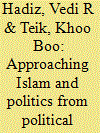

|
|
|
|
|
| Publication |
2011.
|
| Summary/Abstract |
The article traces the trajectories of Islamic politics in Indonesia and Malaysia in relation to the changing political economy of these two countries. The approach adopted is to understand Islamic politics less on the basis of Islamic doctrine, or conflicts over its interpretation, than in connection with the changing social bases of politics, the context established by capitalist economic transformations, the evolution of the post-colonial state from the Cold War and its aftermath, and of crises of political economy in the 1980s and 1990s. The exercise reveals important convergences and divergences in trajectories that help to explain the complex historical processes which have shaped Islamic politics in these two cases and possibly beyond. It also reveals the entanglement of Islamic politics in very profane conflicts over power and tangible economic resources over time. In both countries a new form of Islamic populism has emerged as a major articulator of grievances against the secular state and perceived social injustices. However, the same historical processes have enabled the social agents of Islamic politics in Malaysia to contest state power more effectively than their counterparts in Indonesia.
|
|
|
|
|
|
|
|
|
|
|
|
|
|
|
|
| 2 |
ID:
133505
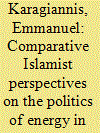

|
|
|
|
|
| Publication |
2014.
|
| Summary/Abstract |
The article will describe the general Islamic approach on energy based on the Sunnah of Prophet Muhammad, as well as the writings of prominent Muslim thinkers. Then it will examine and compare the energy perspectives of four Islamist groups: Hizballah, Hizb ut-Tahrir, the Muslim Brotherhood, and Al Qaeda. It will be argued that Islamist groups have attempted to achieve their external energy objectives by either using violence or exercising political blackmail against their opponents. Moreover, Islamists have developed globalized, glocalized, or localized "scale of engagement," depending on the targeted audience. Finally, the article will examine the security implications stemming from Islamists' interest in energy issues.
|
|
|
|
|
|
|
|
|
|
|
|
|
|
|
|
| 3 |
ID:
112172
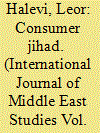

|
|
|
|
|
| Publication |
2012.
|
| Summary/Abstract |
This article deals with the origins, development, and popularity of boycott fatwas. Born of the marriage of Islamic politics and Islamic economics in an age of digital communications, these fatwas targeted American, Israeli, and Danish commodities between 2000 and 2006. Muftis representing both mainstream and, surprisingly, radical tendencies argued that jihad can be accomplished through nonviolent consumer boycotts. Their argument marks a significant development in the history of jihad doctrine because boycotts, construed as jihadi acts, do not belong to the commonplace categories of jihad as a "military" or a "spiritual" struggle. The article also demonstrates that boycott fatwas emerged, to a large degree, from below. New media, in particular interconnected computer networks, made it easier for laypersons to drive the juridical discourse. They did so before September 11 as well as, more insistently, afterward. Their consumer jihad had some economic impact on targeted multinationals, and it provoked corporate reactions.
|
|
|
|
|
|
|
|
|
|
|
|
|
|
|
|
| 4 |
ID:
191626
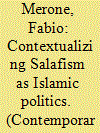

|
|
|
|
|
| Summary/Abstract |
This article examines Salafism as part of what it defines as ‘Islamic politics’, a modern phenomenon of activism and human agency based on an ideological conception of Islam—the ‘Islamic political theology of the praxis’—that is both a comprehensive vision of the world and its pro-active implementation. This article’s starting point is Wiktorowicz’s 2006 seminal article, ‘Anatomy of the Salafi movement’. This article highlights the epistemological underpinning of his work. Analysing Wiktorowicz’s broader intellectual contribution, especially his 2004 book on ‘Islamic activism’, it is possible to emphasize that Wiktorowicz was interested in epistemologically centring the study on Islamic activism (Islamism and Salafism together). From this starting point, the article argues that both Salafism and Islamism should be considered part of the practical activity of ‘doing politics’ within an ideological vision of Islam. The term proposed here is thus ‘Islamic politics’, a frame through which the development of both Islamism and Salafism is examined. In line with Wiktorowicz, this article supports the contention that the context matters, but it also argues that ideology as also a relevant factor.
|
|
|
|
|
|
|
|
|
|
|
|
|
|
|
|
| 5 |
ID:
112180
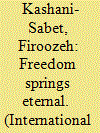

|
|
|
|
|
| Publication |
2012.
|
| Summary/Abstract |
Revolutions are chaotic affairs. In February 1979, when Ayatollah Khomeini and his followers declared victory, Iran's future seemed uncertain. After a long night of hostility and bloodshed, an eerie silence fell on Tehran, and in some corners fear supplanted exhilaration. Those of us who witnessed these historic events did not fully fathom what Islamic politics augured. Within weeks, on the occasion of International Women's Day, it became clear that women had become targets of the regime's cultural indoctrination. Other matters remained murky for months and would play out gradually in the first decade after the revolution.
|
|
|
|
|
|
|
|
|
|
|
|
|
|
|
|
| 6 |
ID:
119944
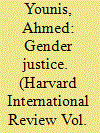

|
|
|
| 7 |
ID:
076561
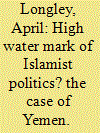

|
|
|
| 8 |
ID:
098990
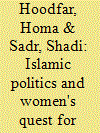

|
|
|
|
|
| Publication |
2010.
|
| Summary/Abstract |
The unification of a strong and authoritarian state with religious laws and institutions after the 1979 revolution in Iran has resulted in the creation of a dualistic state structure in which non-elected and non-accountable state authorities and institutions-the majority of whom have not accepted either the primacy of democracy nor the premise of equality between men and women (or Muslims and non-Muslims)-are able to oversee the elected authorities and institutions. The central question posed by this paper is whether a religious state would be capable of democratising society and delivering gender equality. By analysing the regime's gender policies and political development, the paper suggests that, at least in the case of Iran and Shi'ism, the larger obstacle to gender (and minorities') equality has more to do with the undemocratic state-society relations that persist in Iran and less to do with the actual or potential compatibility (or lack thereof) of religious traditions or practices with democratic principles.
|
|
|
|
|
|
|
|
|
|
|
|
|
|
|
|
| 9 |
ID:
064784
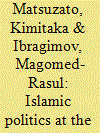

|
|
|
| 10 |
ID:
075384
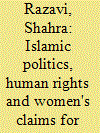

|
|
|
|
|
| Publication |
2006.
|
| Summary/Abstract |
Polemical assertions about the civilisational clash between Islam and Christianity, and Islam's incompatibility with human rights and gender equality are frequently heard these days. Political Islam, however, is far from homogeneous, and the modernist and reformist currents which have emerged in many diverse contexts often seek to embrace both human rights and gender equality. This paper analyses the diverse currents of thinking that feed into the reformist orientation in Iran. The need for change and reform is being voiced not only by secular forces, but also by the 'true believers', who have included male lay intellectuals, some clerical authorities, and a number of feminists with an Islamic orientation. These disparate streams of reformist thinking constitute a genuinely local effort to move Islamic politics out of the cul-de-sac of traditional Islam by endorsing modernist and universal values of human rights, democracy and gender equality. While these emerging voices represent a paradigm shift in Islamic thought, their political impact has been far from significant. The reasons for this weakness are complex, and include both domestic and external factors explored in the second half of the paper.
|
|
|
|
|
|
|
|
|
|
|
|
|
|
|
|
| 11 |
ID:
082169
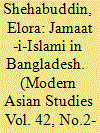

|
|
|
|
|
| Publication |
2008.
|
| Summary/Abstract |
This article argues that leaders of the Jamaat-i-Islami in Bangladesh regularly invoke women's privileged status as mothers to counter the claims of the largely secularist non-governmental organizations operating in the country today that Islam has been harmful to women and that the only route to progress is to discard the shackles of religion and tradition. The current Jamaat rhetoric marks a significant change from the original Jamaat position-elaborated by the party's founder Abul Ala Maududi-that women's divinely ordained place is in the home. Now, several decades later, Jamaat leaders in Bangladesh still enjoin women to fulfil domestic obligations; however, they also go to great lengths to highlight Islam's recognition of women as 'individuals' with 'individual' responsibilities to God and Islam as well as Islam's support for women's right to study, work and vote. I contend that the Jamaat in Bangladesh has been prompted to undertake these recent modifications by specific developments in local social and political contexts, specifically the twin pressures on the Jamaat of operating in a functioning, if often imperfect, democratic polity; and of competing with more secular organizations for the hearts, minds and votes of impoverished women
|
|
|
|
|
|
|
|
|
|
|
|
|
|
|
|
| 12 |
ID:
105396


|
|
|
| 13 |
ID:
055006
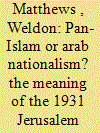

|
|
|
| 14 |
ID:
020989
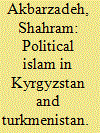

|
|
|
|
|
| Publication |
2001.
|
| Description |
451-465
|
|
|
|
|
|
|
|
|
|
|
|
|
|
|
|
| 15 |
ID:
151733


|
|
|
|
|
| Summary/Abstract |
This article examines the Darul Islam (DI) movement in Indonesia, which has sought to establish an Islamic state since the end of the colonial era. It questions why the movement has been resilient in spite of almost perennial political isolation and marginalization and numerous internal permutations. The article argues that the evolution of the movement has been intricately related to the exigencies of operating in the context of profound social, economic, and political changes associated with state formation and capitalist development in Indonesia since the 1940s. The DI experience helps us to understand the appeal of radical Islamist movements which voice dissent against perceived social injustices within national states where the left is no longer a viable social force.
|
|
|
|
|
|
|
|
|
|
|
|
|
|
|
|
| 16 |
ID:
103505
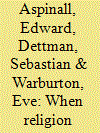

|
|
|
|
|
| Publication |
2011.
|
| Summary/Abstract |
The authors analyse the 2010 mayoral election in the city of Medan, North Sumatra. Medan is an ethnically and religiously diverse city and the authors treat the elections here as a case study of inter-communal dynamics in local elections in plural regions of Indonesia. The first round of the vote was contested by 10 pairs of candidates and occurred in a climate of cross-ethnic alliance building and appeals that, the authors argue, are typical of broader Indonesian patterns. The second round confronted voters with a choice between a Muslim candidate and an ethnic Chinese candidate who was also a Buddhist. There was a sudden switch in the tone and themes of the contest. A concerted campaign was launched to convince Muslim voters to support the Muslim candidate, with politicians and religious leaders alike suggesting that it was a religious obligation to do so. The campaign proved effective and the Muslim candidate, a member of the province's established political elite, won by a large margin. The article focuses on the campaign teams' strategies, analysing their electoral calculations and the techniques used to appeal to a multi-ethnic constituency. It also considers the role played in the poll by Medan's rich array of ethnic associations. The authors conclude by pointing to lessons of the Medan case for wider patterns of ethnic coalition building in Indonesia. They also describe this election as an example of the 'identity switching' that can take place when political actors choose from multiple and overlapping identity categories in changing political contexts.
|
|
|
|
|
|
|
|
|
|
|
|
|
|
|
|
|
|
|
|
|